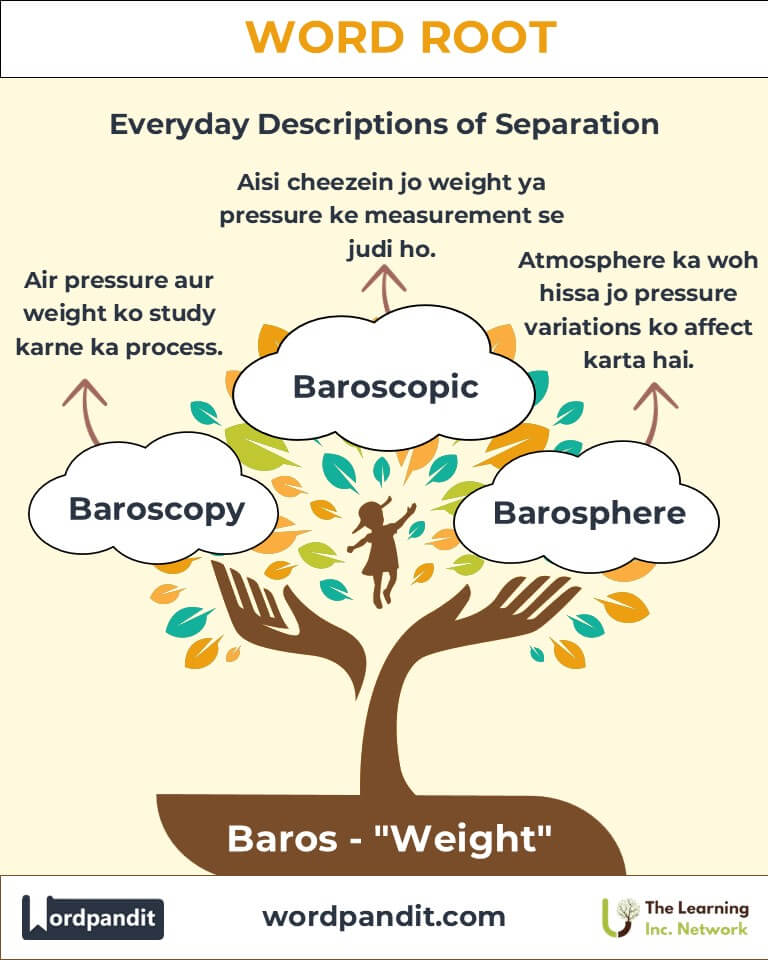Baros: The Measure of Weight in Language and Science
Discover the depth of the root "baros," a Greek word meaning "weight." From instruments like barometers to scientific fields like barology, this root carries the essence of measurement, pressure, and gravity, bridging everyday use with specialized disciplines.

Table of Contents
- Introduction: The Weighty Significance of Baros
- Etymology and Historical Journey
- Mnemonic: Unlocking the Power of Baros
- Common Baros-Related Terms
- Baros Through Time
- Baros in Specialized Fields
- Illustrative Story: Baros in Action
- Cultural Significance of Baros
- The Baros Family Tree
- FAQs about the Baros Word Root
- Test Your Knowledge: Baros Word Root Quiz
- Conclusion: The Lasting Weight of Baros
Introduction: The Weighty Significance of Baros
The root baros, pronounced bah-ross, originates from Greek and means "weight" or "pressure." It underpins terms used in science, medicine, and even philosophy to describe the literal and metaphorical burdens of weight. From the barometer—a device measuring atmospheric pressure—to barology, the study of weight, "baros" conveys the foundational force of gravity and its implications.
Etymology and Historical Journey
The term baros stems from the Greek word βάρος, which translates directly to "weight." Ancient Greek scholars explored the concept of weight in the context of balance, mechanics, and philosophy, linking it to ideas of burden and responsibility. The word entered modern scientific vocabulary in the 17th century with instruments like the barometer, which emerged during advances in meteorology and physics.
Mnemonic: Unlocking the Power of Baros
Imagine a balloon inflating as air pressure builds around it. Think of "baros" as the invisible force pushing against the balloon, representing weight and pressure.
Mnemonic Device: "Baros balances the balloon—its pressure shows the weight we rely on."
Common Baros-Related Terms
- Barometer (bah-rom-eh-ter)
- Definition: An instrument measuring atmospheric pressure.
- Example: "The barometer indicated a drop in pressure, forecasting rain."
- Barology (bah-rol-oh-jee)
- Definition: The study of weight or pressure, especially in physics.
- Example: "Barology offers insights into how gravity affects materials."
- Isobar (eye-so-bar)
- Definition: A line on a weather map connecting points of equal pressure.
- Example: "The isobars showed a high-pressure system over the region."
- Baritone (bah-ri-tone)
- Definition: A male singing voice of medium weight and range.
- Example: "The baritone’s rich voice added depth to the choir."
- Hyperbaric (hy-per-bar-ik)
- Definition: Relating to higher-than-normal atmospheric pressure.
- Example: "Hyperbaric chambers are used to treat decompression sickness."
Baros Through Time
- Baroscope (17th Century): A device used historically to demonstrate the principles of atmospheric pressure.
- Example: Early scientists used baroscopes to understand weight distribution in air.
- Barotrauma (Modern Medicine): Injury caused by pressure differences, particularly in diving or air travel.
- Relevance: Advances in barology have helped develop treatments for pressure-related injuries.
Baros in Specialized Fields
- Meteorology:
- The barometer is crucial for weather forecasting, as it measures changes in atmospheric pressure.
- Aviation and Diving:
- Terms like barotrauma describe the effects of pressure changes on the human body, guiding safety protocols.
- Music:
- Baritone, derived from "baros," conveys the weight of sound in a vocal range, adding richness to compositions.
- Physics:
- Barology aids in understanding how pressure affects structures and systems under varying gravitational forces.
Illustrative Story: Baros in Action
In a small coastal town, a young scientist named Elena was fascinated by storms. Using a homemade barometer, she tracked pressure changes, predicting a major storm’s arrival before the news did. Her accurate forecast helped the community prepare and avoid disaster. Elena’s understanding of "baros" showed how mastering weight and pressure could save lives and inspire others.
Cultural Significance of Baros
Beyond its scientific uses, baros has metaphorical implications in literature and philosophy. It represents burdens—both physical and emotional—highlighting the weight of responsibility or decision-making. This duality enriches its presence in human thought, from ancient Greek discussions of justice to modern poetry describing life’s pressures.
The Baros Family Tree
- Grav- (Latin: "weight, heavy")
- Gravity: The force pulling objects toward each other.
- Gravitas: Seriousness or weight in character.
- Press- (Latin: "to press")
- Pressure: Continuous physical force exerted on an object.
- Impression: A lasting effect created by physical or emotional pressure.
- Ton- (Greek: "stretch, tension")
- Tonal: Relating to sound weight or quality.
- Tonnage: Measurement of weight in tons.

FAQs About " Baros "
Q: What does "baros" mean?
A: The root "baros" means "weight" or "pressure" and is derived from the Greek word βάρος. It is used in scientific and technical terms to describe forces or conditions related to heaviness or atmospheric pressure.
Q: What is a barometer?
A: A barometer is a scientific instrument that measures atmospheric pressure, helping predict weather changes. A drop in pressure usually indicates stormy weather, while rising pressure suggests clear skies.
Q: What is barology?
A: Barology is the study of weight and pressure, primarily in the context of physics. It explores how pressure impacts objects and phenomena, such as atmospheric changes or material stress.
Q: What does "isobar" mean on a weather map?
A: An isobar is a line that connects locations with the same atmospheric pressure on a weather map. Isobars help meteorologists visualize pressure systems, making it easier to forecast storms or calm weather.
Q: What is hyperbaric oxygen therapy?
A: Hyperbaric oxygen therapy involves breathing pure oxygen in a chamber with higher-than-normal air pressure. It is used to treat medical conditions such as decompression sickness, infections, and wounds that heal slowly.
Q: How is "baros" connected to music?
A: The term baritone derives from "baros" and means "medium weight." It describes a male voice range that sits between bass (heavy) and tenor (light), adding richness to vocal compositions.
Q: How does "baros" symbolize burdens metaphorically?
A: In literature and philosophy, "baros" represents emotional or psychological weight, such as the burden of responsibility, grief, or life’s challenges. It captures the gravity of figurative pressures in human experiences.
Q: What is barotrauma?
A: Barotrauma refers to injuries caused by pressure differences in the body, often experienced during activities like scuba diving or air travel. Common examples include ear pain or lung issues from rapid pressure changes.
Q: Why are barometers important in weather forecasting?
A: Barometers measure atmospheric pressure, which is critical in predicting weather patterns. Sudden drops in pressure often signal storms, while steady or rising pressure indicates stable weather conditions.
Q: What is the historical significance of baroscopes?
A: Baroscopes were early scientific tools used to demonstrate atmospheric pressure. They played a crucial role in helping scientists like Torricelli and Pascal develop foundational theories about air pressure and vacuum dynamics.
Test Your Knowledge: " Baros " Mastery Quiz
1. What does the root "baros" signify?
2. What is the primary use of a barometer?
3. Which term describes lines of equal pressure on a weather map?
4. What does "hyperbaric" refer to in medical contexts?
5. What does "barology" study?
Conclusion: The Lasting Weight of Baros
The root baros connects the tangible and intangible aspects of weight. From scientific instruments like barometers to philosophical discussions on responsibility, it enriches our understanding of gravity, pressure, and balance in life. As technology advances and our need for precision grows, baros will continue to bear the weight of significance across disciplines and cultures.













